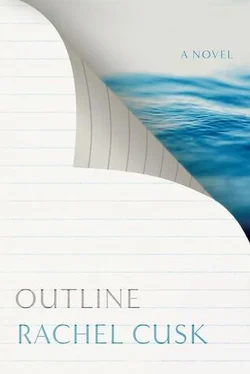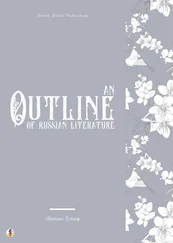The waiter loomed beside our table; the restaurant was apparently closing now, and Angeliki rose, looking at her little silver watch and saying that she had enjoyed herself so much she had entirely lost track of the time. She had to be up early in the morning, for a television interview; ‘but it was such a pleasure’, she said, holding out her hand to me, ‘to meet you. I think Paniotis would have preferred to have you to himself, but I’m afraid I insisted, since you were here, on my right to take part. I will treasure our conversation,’ she said, squeezing my fingertips; ‘perhaps we can meet again and continue it, woman to woman, the next time I am in London.’
She opened her bag and took out a little card with her details on, which she handed to me; with a swirl of her dress and a flicker of her silver heels she was gone, and I saw her face passing briefly outside the window, set once more in its striking configuration of frowning lines, which brightened when she caught my eye through the glass and raised her hand in farewell.
‘If I may I will walk with you,’ Paniotis said, ‘as far as your apartment.’
As we set off down the dark, hot pavement towards the main road with its throbbing lights and unceasing sound of traffic, he told me that Angeliki was angry with him, because he was editing an anthology of Greek writing from which her work had been omitted.
‘Vanity’, he said, ‘is the curse of our culture; or perhaps it is simply my own persistent refusal’, he said, ‘to believe that artists are also human beings.’
I said that in fact I had liked Angeliki, though she appeared to have forgotten that we had met before, at a reading I gave several years ago in Athens where she and her husband were among the audience. Paniotis laughed.
‘That was another Angeliki,’ he said, ‘an Angeliki who no longer exists and has been written out of the history books. Angeliki the famous writer, the feminist of international renown, has never met you before in her life.’
When we reached the entrance to my apartment building, Paniotis looked at the larger-than-life figures in the darkness of the café window, the woman still laughing, the man still crinkling his eyes at her in all his handsome false modesty.
‘At least they’re happy,’ he said. He opened his briefcase and took out an envelope and pressed it into my hand. ‘It remains your truth,’ he said, ‘whatever has happened. Don’t be afraid to look at it.’
It was a curious group — a mixed bag, as Ryan had put it. Watch out for the kid with the Demis Roussos hair and the bumfluff, he said, he simply won’t shut up.
The room was small and grey, but it had large windows overlooking Kolonaki Square, a concrete enclosure where people sat reading newspapers on benches in the shade of plane trees with graffitied concrete bases. The hot spaces were already deserted at ten o’clock in the morning. Pigeons advanced in their circling, tatty formations across the paving slabs with their heads down, pecking.
The students were discussing whether the windows should be open or shut, for the room was morbidly cold and no one had been able to work out how to turn down the air conditioning. There was also the question of whether the door should be open or closed, the lights on or off, and whether the computer, which was projecting a blank blue rectangle on to the wall and making a humming noise, would be needed or could be closed down. I had already noticed the boy Ryan mentioned, who had a great shock of black curly hair that flowed down over his shoulders, and a nascent moustache of slightly paler hair nestling on his upper lip. Of the others it was hard at first to get any sense at all. There seemed to be a roughly equal number of men and women, but no two of them shared any characteristic of age, dress or social type. They had taken their places around a large white Formica table that was really a number of smaller tables pushed together to form a square. There was an atmosphere of uncertainty, almost of unease, in the anonymous room. I reminded myself that these people wanted something from me; that though they didn’t know me, or one another, they had come here with the purpose of being recognised.
It was decided that the windows should be opened but the door shut, and the person nearest to each side got up to do so. Ryan’s boy observed that it did seem odd to be opening the windows to warm up a room, but that science had involved us in many such inversions of reality, some of which were more useful than others. We should accept occasionally being inconvenienced by our conveniences, he said, just as we had to tolerate flaws in our loved ones: nothing was ever perfect, he said. Many of his fellow Greeks, he continued, believed that air conditioning was severely deleterious to health, and there was now a nationwide movement to keep it switched off in offices and public buildings, a sort of back-to-nature idea which was itself perfectionism of a kind, though it meant that everybody got very hot; which, he concluded somewhat delightedly, could only result in air conditioning being invented all over again.
I took a piece of paper and a pen and drew the shape of the large square table at which we all sat. I asked them for their names, of which there were ten in all, and wrote each one down in their place around the square. Then I asked each of them to tell me something they had noticed on their way here. There was a long, shuffling silence of transition; people cleared their throats, rearranged the papers in front of them or gazed blankly into space. Then a young woman, whose name, according to my diagram, was Sylvia, began to speak, having glanced around the room apparently to ascertain that no one else was going to take the initiative. Her small, resigned smile made it clear that she often found herself in this position.
‘When I was getting off the train,’ she said, ‘I noticed a man standing on the platform with a small white dog on his shoulder. He himself was very tall and dark,’ she added, ‘and the dog was quite beautiful. Its coat was curly and as white as snow, and it sat on the man’s shoulder and looked around itself.’
Another silence ensued. Presently a man of very neat and diminutive appearance — Theo, according to my diagram — who had come formally dressed in a pinstriped suit, put up his hand to speak.
‘This morning,’ he said, ‘I was crossing the square opposite my apartment building, on my way to the metro, and I saw on one of the low concrete walls around the square a woman’s handbag. It was a large and very expensive-looking handbag,’ he said, ‘made of the shiniest black patent leather with a gold clasp at the top, and it was standing there quite open on the wall. I looked around for a person likely to own such a thing, but the square was deserted. I wondered then whether the owner had been robbed, and the handbag left there while its contents had been stolen, but when I approached and looked inside — for the clasp was undone and the top was wide open, and I could examine the interior without touching it — I saw that everything was still there, a leather wallet, a set of keys, a powder compact and lipstick, even an apple that was presumably intended for a snack during the day. I stood there for quite a while, waiting to see who would turn up, and when nobody did I walked to the metro after all, because I had seen that otherwise I would be late. But I realised, while I was walking, that I should have taken the bag to a police station.’
Theo stopped, his story apparently at an end. The others immediately flew at him with a volley of questions. Having realised he should have handed the bag in to the police, why didn’t he turn around and go back? If he was late, why had he not simply handed the bag in at a nearby shop or even a kiosk, for safe keeping, or at the very least told a passer-by about the situation? He could even have taken the bag with him, and made the necessary calls at a more convenient time — better that than just to leave it there, for anyone to steal! Theo sat through this interrogation with his arms folded across his chest, a benign expression on his small, neat face. After a considerable length of time, when the questions had died down, he spoke again.
Читать дальше












